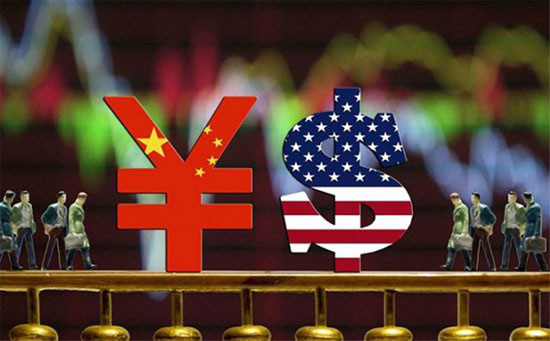


(file photo)
China could take three countermeasures against the recent “Section 301” investigation initiated by the U.S. government, experts told Chinanews.com.
With growing trade friction between the two largest economies, the spokesperson of China's Ministry of Commerce made a strong response on Monday, saying China strongly opposes unilateral and trade protectionism acts conducted by the U.S., and will take all appropriate measures to safeguard its legitimate interests.
According to the report, limiting imports from the U.S., reducing exports to the U.S., and unloading dollar assets would be the most effective countermeasures.
China is America's largest export market behind the North America region, and also one of the fastest-growing export markets of the U.S. Uncle Sam relies heavily on China for trade.
Statistics show that the annual growth in exports from the U.S. to China averaged 11% in the past decade, almost twice the figure of Chinese exports to the U.S. Sixty-two percent of soybean, 14% of cotton, 25% of Boeing aircraft, 17% of automobiles, and 15% of integrated circuits produced by the U.S. have been shipped to China.
In addition, China is the second-largest export market of American agricultural products, buying 15% of the total export volume, according to U.S. government data.
Against such a backdrop, restricting imports of agricultural products and high-end goods would be a trump card for China as a counter action.
Marcus Noland, executive vice president of the Peterson Institute for International Economics, once said during an interview that it would be destructive if China limits the imports of American soybean and aircraft.
In addition, being the largest export market of China, the U.S. enjoys the benefits of cost-effective “made-in-China” products.
According to data released by the US-China Business Council, trade with China has saved American families $850 in 2015 on average. Oxford Economics estimates that China's low-price goods have resulted in a 1-1.5% lower price level in the U.S.
At a time when Americans are expecting Donald Trump's new trade policy to improve the current situation, the bilateral trade conflict would be damaging, said Lian Ping, chief economist of the Bank of Communications. Even small losses are unacceptable, he added.
Besides, China regained the title of Uncle Sam's largest creditor in June. America's financial stability would be impacted if China unloads its dollar assets on a large scale.
However, these three countermeasures would also harm China. As Chinese officials have stressed, there is no winner or future in a trade war.
Because of the resilience and huge potential of the Chinese economy, the U.S. would be worse hit in the long run, said Wang Wen, executive dean of the Chongyang Institute for Financial Studies at Renmin University of China.
With a complete industrial system, China is the only country in the world that owns all industrial sectors listed in the United Nations industrial classification of all economic activities.
Once conflict deepens, America's losses may not necessarily be less than China's losses, noted Bai Ming, executive director of the Institute of International Trade of Chinese Academy of International Trade and Economic Cooperation under the Ministry of Commerce.
Mutual benefit leads to win-win results. Only by the joint efforts of both parties can trade relations between the two countries be pushed forward in a healthy manner.
 Fire brigade in Shanghai holds group wedding
Fire brigade in Shanghai holds group wedding Tourists enjoy ice sculptures in Datan Town, north China
Tourists enjoy ice sculptures in Datan Town, north China Sunset scenery of Dayan Pagoda in Xi'an
Sunset scenery of Dayan Pagoda in Xi'an Tourists have fun at scenic spot in Nanlong Town, NW China
Tourists have fun at scenic spot in Nanlong Town, NW China Harbin attracts tourists by making best use of ice in winter
Harbin attracts tourists by making best use of ice in winter In pics: FIS Alpine Ski Women's World Cup Slalom
In pics: FIS Alpine Ski Women's World Cup Slalom Black-necked cranes rest at reservoir in Lhunzhub County, Lhasa
Black-necked cranes rest at reservoir in Lhunzhub County, Lhasa China's FAST telescope will be available to foreign scientists in April
China's FAST telescope will be available to foreign scientists in April "She power" plays indispensable role in poverty alleviation
"She power" plays indispensable role in poverty alleviation Top 10 world news events of People's Daily in 2020
Top 10 world news events of People's Daily in 2020 Top 10 China news events of People's Daily in 2020
Top 10 China news events of People's Daily in 2020 Top 10 media buzzwords of 2020
Top 10 media buzzwords of 2020 Year-ender:10 major tourism stories of 2020
Year-ender:10 major tourism stories of 2020 No interference in Venezuelan issues
No interference in Venezuelan issues
 Biz prepares for trade spat
Biz prepares for trade spat
 Broadcasting Continent
Broadcasting Continent Australia wins Chinese CEOs as US loses
Australia wins Chinese CEOs as US loses